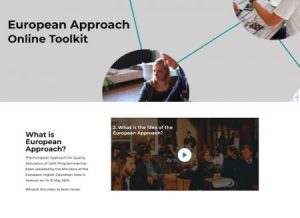Facilitating implementation of the European Approach for Quality Assurance of Joint Programmes (ImpEA)
EQAR was an associate partner of this Erasmus+-funded project, involving ENQA, ECA, several registered QA agencies and several higher education institutions as partners. The main aim of the project was to support efficient implementation of the European Approach for Quality Assurance of Joint Programmes.
Following the production of a background report, the QA agencies involved implemented accreditation/evaluation procedures based on the European Approach, thus creating more good practice use cases that can now serve as role models.
This resulted in a very practical European Approach Online Toolkit, an excellent resource for both higher education institutions and quality assurance agencies. This toolkit consists not only of written explanations but also of step-by-step video guidelines, beginning with “What is the idea of the European Approach?”.

General project description
The European Approach for Quality Assurance of Joint Programmes was adopted at the Bologna Process Ministerial Conference in Yerevan in May 2015. The European Approach is a step towards minimising barriers in external quality assurance of joint programmes. However, to date, only a few countries have fully integrated the European Approach into their accreditation procedures, and several difficulties in implementing the Approach persist.
The “Facilitating implementation of the European Approach for Quality Assurance of Joint Programmes (ImpEA)” project consortium hopes to address this issue by exploring the existing challenges in the use of the European Approach and sharing some of the success stories and good practices that can be used to support the further use of the European Approach in different contexts.
The main aim of the project will be to support efficient implementation of the European Approach for Quality Assurance of Joint Programmes. This aim will be achieved by successful completion of the following objectives:
- Identifying key obstacles in implementation of the European Approach in the European Higher Education Area in general, and project partner countries in particular;
- Supporting partner QA agencies in running EA-based programme accreditation procedures (ex ante and ex post);
- Supporting partner HEI in pursuing the external accreditation based on the EA;
- Developing a EA implementation toolkit (set of recommendations and proposed solutions for the policy makers and QA agencies).
- Polish Accreditation Committee (PKA), coordinator
- European Consortium for Accreditation in Higher Education (ECA)
- European Association for Quality Assurance in Higher Education (ENQA)
- Agency for Quality Assurance through Accreditation of Study Programmes (AQAS)
- Basque University System Quality Assurance Agency (Unibasq)
- Adam Mickiewicz University (AMU)
- University of Deusto (UD)
- Warsaw School of Tourism and Recreation
- Carl von Ossietzky University of Oldenburg
- EQAR (associate partner)